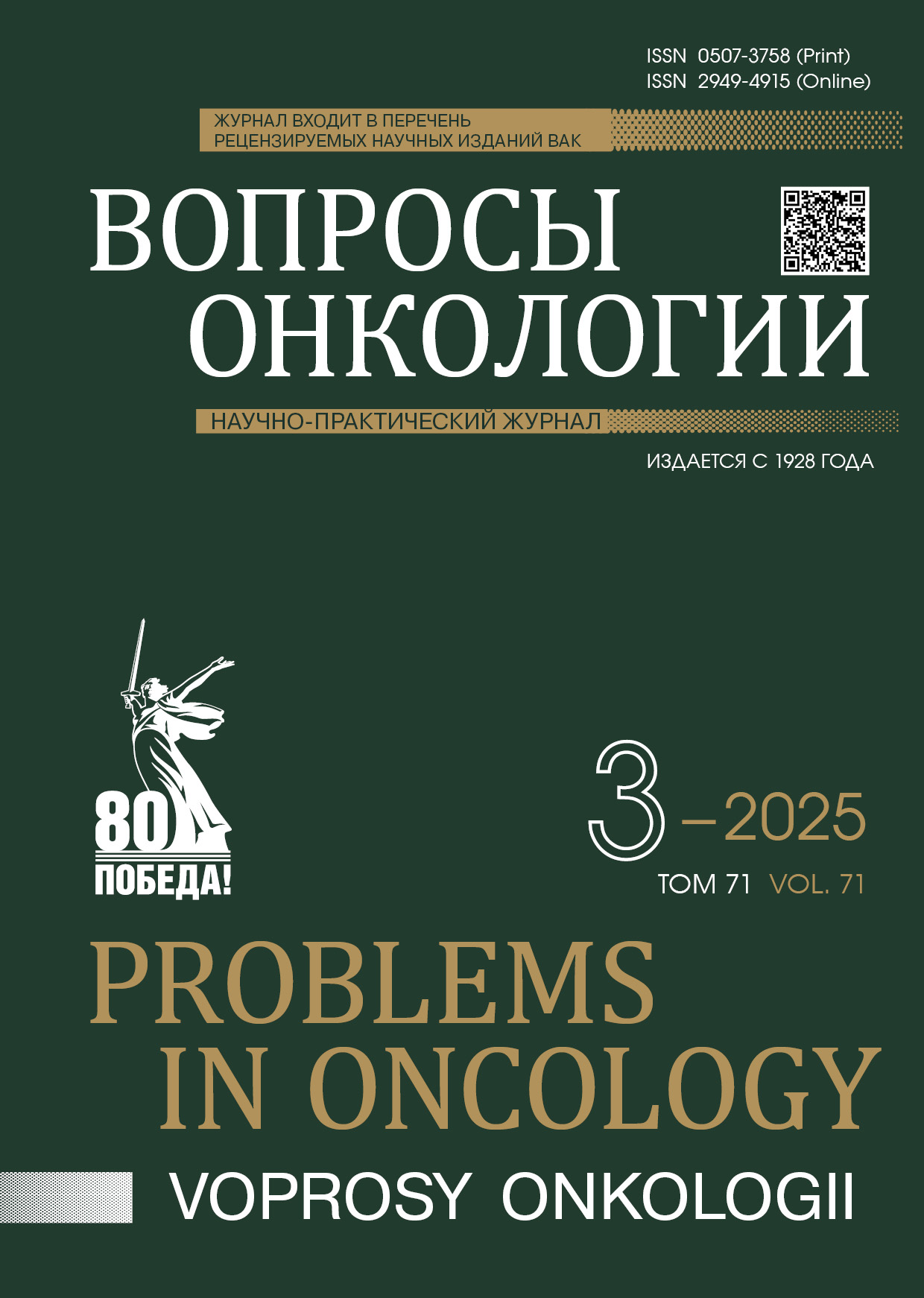Abstract
Introduction. Although artificial intelligence (AI) shows promise in predicting satisfaction with aesthetic outcomes after breast cancer reconstruction, there are no dedicated studies in Russia, and the available AI perspectives are based on a small number of foreign publications.
Aim. To develop and obtain preliminary performance metrics for a machine learning-based model that predicts aesthetic satisfaction of female patients after breast reconstruction, using clinical and anamnesis data.
Materials and Methods. In the period from 2015 to 2024, information was retrospectively collected on 333 patients who had previously undergone complex treatment for breast cancer at the St. Petersburg State Clinical Oncologic Dispensary and received one-stage or delayed breast reconstruction during treatment. The inputs comprised quantitative and qualitative clinical and anamnesis data. Five different machine learning algorithms were compared: Support Vector Machine (SVM), K-Nearest Neighbors (KNN), Logistic Regression (LR), XGBoost and Decision Trees (DT).
Results. Logistic regression demonstrated the best performance on all key metrics, including sensitivity (0.84) and accuracy (0.73). Among patients who had undergone neoadjuvant chemotherapy (NACT) and/or radiation therapy (RT), the factor of final weight before surgery was the most prognostically significant, confirming the positive effect of this metric. The opposite results were obtained for initial weight, indicating that being overweight has an inherently negative effect on patient satisfaction after reconstruction. The surgeon's experience, comorbidities, postoperative LT and preoperative disease stage were also important factors. The final ROC-AUC value was 0.7, which is acceptable for diagnostic systems under development at an intermediate stage.
Conclusion. The performance metrics obtained from the second opinion system for predicting satisfaction with the aesthetic outcome of breast cancer reconstruction are promising. This is despite the obvious limitations and approaches to levelling them so that other inputs can be included in the prognostic model, and so that the accuracy metrics can be reproduced in external testing.
References
Семиглазов В.Ф., Мерабишвили В.М., Семиглазов В.В., et al. Эпидемиология и скрининг рака молочной железы. Вопросы онкологии. 2017; 63(3): 375-84.-DOI: 10.37469/0507-3758-2017-63-3-375-384. [Semiglazov V.F., Merabishvili V.M., Semiglazov V.V., et al. Epidemiology and screening of breast cancer. Voprosy Onkologii = Problems in Oncology. 2017; 63(3): 375-84.-DOI: 10.37469/0507-3758-2017-63-3-375-384 (In Rus)].
Бересток Т.С., Закиряходжаев А.Д., Ермощенкова М.В., et al. Осложнения после одномоментной и двухэтапной реконструкции имплантатами у больных раком молочной железы при проведении комбинированного/комплексного лечения. Онкология. Журнал им. П.А. Герцена. 2023; 12(3): 54-61.-DOI: 10.17116/onkolog20231203154. [Berestok T.S., Zakiryakhodzhaev A.D., Ermoshchenkova M.V., et al. Complications after single-stage and two-stage implant reconstruction in breast cancer patients during combined/complex treatment. P.A. Herzen Journal of Oncology. 2023; 12(3): 54-61.-DOI: 10.17116/onkolog20231203154 (In Rus)].
Nair A.G., Giannakeas V., Semple J.L., et al. Contemporary Trends in Breast Reconstruction Use and Impact on Survival Among Women with Inflammatory Breast Cancer. Ann Surg Oncol. 2022; 29(13): 8072–8082.-DOI: 10.1245/s10434-022-12408-0.
Kim M., Vingan P., Boe L.A., et al. Satisfaction with breasts following autologous reconstruction: assessing associated factors and the impact of revisions. Plast Reconstr Surg. 2025; 155(2): 235-244.-DOI: 10.1097/PRS.0000000000011571.
Bajwa J., Munir U., Nori A., Williams B. Artificial intelligence in healthcare: transforming the practice of medicine. Futur Healthc J. 2021; 8(2): e188–e194.-DOI: 10.7861/fhj.2021-0095.
Mahesh N., Devishamani C.S., Raghu K., et al. Advancing healthcare: the role and impact of AI and foundation models. Am J Transl Res. 2024; 16(6): 2166-2179.-DOI: 10.62347/WQWV9220.
Maita K.C., Avila F.R., Torres-Guzman R.A., et al. The usefulness of artificial intelligence in breast reconstruction: a systematic review. Breast Cancer. 2024; 31(4): 562–571.-DOI: 10.1007/s12282-024-01582-6.
Pfob A., Mehrara B.J., Nelson J.A., et al. Machine learning to predict individual patient-reported outcomes at 2-year follow-up for women undergoing cancer-related mastectomy and breast reconstruction (INSPiRED-001). Breast. 2021; 60: 111–122.-DOI: 10.1016/j.breast.2021.09.009.
Srinivasa D.R., Clemens M.W., Qi J., et al. Obesity and Breast Reconstruction: Complications and Patient-Reported Outcomes in a Multicenter, Prospective Study. Plast Reconstr Surg. 2020; 145(3): 481E-490E.-DOI: 10.1097/PRS.0000000000006543.
Mandrekar J.N. Receiver Operating Characteristic Curve in Diagnostic Test Assessment. J Thorac Oncol. 2010; 5(9): 1315–1316.-DOI: 10.1097/JTO.0b013e3181ec173d.
Haibe-Kains B., Adam G.A., Hosny A., et al. Transparency and reproducibility in artificial intelligence. Nature. 2020;586(7829):E14. DOI: 10.1038/s41586-020-2766-y.
Sungkar A., Yarso K.Y., Nugroho D.F., et al. Patients’ satisfaction after breast reconstruction surgery using autologous versus implants: a meta-analysis. Asian Pac J Cancer Prev. 2024; 25(4): 1205–1212.-DOI: 10.31557/APJCP.2024.25.4.1205.
Gurcan F., Soylu A. Learning from imbalanced data: integration of advanced resampling techniques and machine learning models for enhanced cancer diagnosis and prognosis. Cancers (Basel). 2024; 16(19): 3417.-DOI: 10.3390/cancers16193417.
Noseworthy P.A., Attia Z.I., Brewer L.P.C., et al. Assessing and mitigating bias in medical artificial intelligence: the effects of race and ethnicity on a deep learning model for ECG analysis. Circ Arrhythm Electrophysiol. 2020; 13(3): e007988.-DOI: 10.1161/CIRCEP.119.007988.
Xu C., Pfob A., Mehrara B.J., et al. Enhanced surgical decision-making tools in breast cancer: predicting 2-year postoperative physical, sexual, and psychosocial well-being following mastectomy and breast reconstruction (INSPiRED 004). Ann Surg Oncol. 2023; 30(12): 7046–7059.-DOI: 10.1245/s10434-023-13971-w.
Poon A.I.F., Sung J.J.Y. Opening the black box of AI-medicine. J Gastroenterol Hepatol. 2021; 36(3): 581–584.-DOI: 10.1111/jgh.15384.

This work is licensed under a Creative Commons Attribution-NonCommercial-NoDerivatives 4.0 International License.
© АННМО «Вопросы онкологии», Copyright (c) 2025

